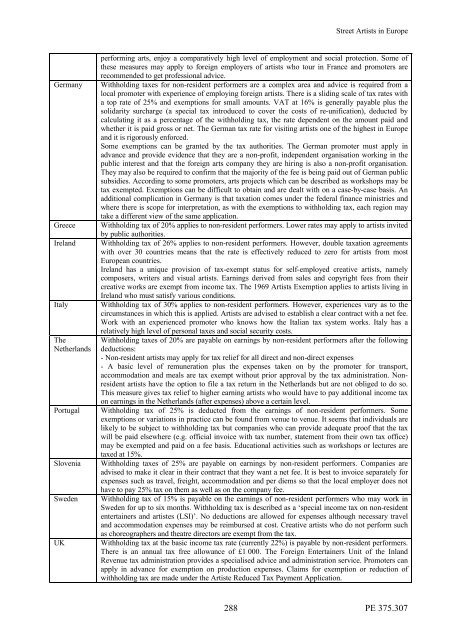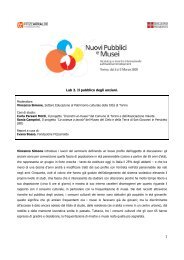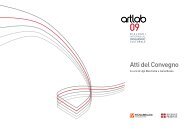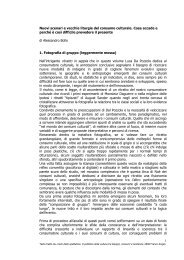STREET ARTISTS IN EUROPE - Fondazione Fitzcarraldo
STREET ARTISTS IN EUROPE - Fondazione Fitzcarraldo
STREET ARTISTS IN EUROPE - Fondazione Fitzcarraldo
You also want an ePaper? Increase the reach of your titles
YUMPU automatically turns print PDFs into web optimized ePapers that Google loves.
Street Artists in Europe<br />
performing arts, enjoy a comparatively high level of employment and social protection. Some of<br />
these measures may apply to foreign employers of artists who tour in France and promoters are<br />
recommended to get professional advice.<br />
Germany Withholding taxes for non-resident performers are a complex area and advice is required from a<br />
local promoter with experience of employing foreign artists. There is a sliding scale of tax rates with<br />
a top rate of 25% and exemptions for small amounts. VAT at 16% is generally payable plus the<br />
solidarity surcharge (a special tax introduced to cover the costs of re-unification), deducted by<br />
calculating it as a percentage of the withholding tax, the rate dependent on the amount paid and<br />
whether it is paid gross or net. The German tax rate for visiting artists one of the highest in Europe<br />
and it is rigorously enforced.<br />
Some exemptions can be granted by the tax authorities. The German promoter must apply in<br />
advance and provide evidence that they are a non-profit, independent organisation working in the<br />
public interest and that the foreign arts company they are hiring is also a non-profit organisation.<br />
They may also be required to confirm that the majority of the fee is being paid out of German public<br />
subsidies. According to some promoters, arts projects which can be described as workshops may be<br />
tax exempted. Exemptions can be difficult to obtain and are dealt with on a case-by-case basis. An<br />
additional complication in Germany is that taxation comes under the federal finance ministries and<br />
where there is scope for interpretation, as with the exemptions to withholding tax, each region may<br />
take a different view of the same application.<br />
Greece Withholding tax of 20% applies to non-resident performers. Lower rates may apply to artists invited<br />
by public authorities.<br />
Ireland Withholding tax of 26% applies to non-resident performers. However, double taxation agreements<br />
with over 30 countries means that the rate is effectively reduced to zero for artists from most<br />
European countries.<br />
Ireland has a unique provision of tax-exempt status for self-employed creative artists, namely<br />
composers, writers and visual artists. Earnings derived from sales and copyright fees from their<br />
creative works are exempt from income tax. The 1969 Artists Exemption applies to artists living in<br />
Ireland who must satisfy various conditions.<br />
Italy Withholding tax of 30% applies to non-resident performers. However, experiences vary as to the<br />
circumstances in which this is applied. Artists are advised to establish a clear contract with a net fee.<br />
Work with an experienced promoter who knows how the Italian tax system works. Italy has a<br />
The<br />
Netherlands<br />
relatively high level of personal taxes and social security costs.<br />
Withholding taxes of 20% are payable on earnings by non-resident performers after the following<br />
deductions:<br />
- Non-resident artists may apply for tax relief for all direct and non-direct expenses<br />
- A basic level of remuneration plus the expenses taken on by the promoter for transport,<br />
accommodation and meals are tax exempt without prior approval by the tax administration. Nonresident<br />
artists have the option to file a tax return in the Netherlands but are not obliged to do so.<br />
This measure gives tax relief to higher earning artists who would have to pay additional income tax<br />
on earnings in the Netherlands (after expenses) above a certain level.<br />
Portugal Withholding tax of 25% is deducted from the earnings of non-resident performers. Some<br />
exemptions or variations in practice can be found from venue to venue. It seems that individuals are<br />
likely to be subject to withholding tax but companies who can provide adequate proof that the tax<br />
will be paid elsewhere (e.g. official invoice with tax number, statement from their own tax office)<br />
may be exempted and paid on a fee basis. Educational activities such as workshops or lectures are<br />
taxed at 15%.<br />
Slovenia Withholding taxes of 25% are payable on earnings by non-resident performers. Companies are<br />
advised to make it clear in their contract that they want a net fee. It is best to invoice separately for<br />
expenses such as travel, freight, accommodation and per diems so that the local employer does not<br />
have to pay 25% tax on them as well as on the company fee.<br />
Sweden Withholding tax of 15% is payable on the earnings of non-resident performers who may work in<br />
Sweden for up to six months. Withholding tax is described as a ‘special income tax on non-resident<br />
entertainers and artistes (LSI)’. No deductions are allowed for expenses although necessary travel<br />
and accommodation expenses may be reimbursed at cost. Creative artists who do not perform such<br />
as choreographers and theatre directors are exempt from the tax.<br />
UK Withholding tax at the basic income tax rate (currently 22%) is payable by non-resident performers.<br />
There is an annual tax free allowance of £1 000. The Foreign Entertainers Unit of the Inland<br />
Revenue tax administration provides a specialised advice and administration service. Promoters can<br />
apply in advance for exemption on production expenses. Claims for exemption or reduction of<br />
withholding tax are made under the Artiste Reduced Tax Payment Application.<br />
288<br />
PE 375.307






